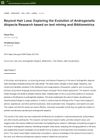 July 2021 in “Journal of dermatology research and therapy”
July 2021 in “Journal of dermatology research and therapy” Using combined treatments can help manage acne by targeting the bacteria and skin changes that cause it.
 1 citations,
September 2023 in “Stem cell research & therapy”
1 citations,
September 2023 in “Stem cell research & therapy” Mesenchymal stem cells could help treat aging-related diseases better than current methods.
 January 2023 in “Eurasian journal of science and engineering”
January 2023 in “Eurasian journal of science and engineering” Medicinal plants in Kurdistan have potential health benefits and need more research for drug development.
3 citations,
October 2023 in “Cosmetics” Healthy lifestyle changes can significantly improve skin health as you age.
September 2022 in “Ukraïnsʹkij naukovo-medičnij molodìžnij žurnal” Quality pharmaceutical care is crucial for safe and effective use of vitamin-mineral supplements during pregnancy and breastfeeding.
6 citations,
June 2021 in “EClinicalMedicine” ALRV5XR significantly improves hair density in women with hair loss and is well-tolerated.
4 citations,
April 2022 in “Microorganisms” Povidone iodine reduced skin bacteria more than chlorhexidine gluconate, but neither met FDA reduction standards.
3 citations,
September 2021 in “EClinicalMedicine” ALRV5XR effectively increases hair density in men with androgenetic alopecia without adverse effects.
 August 2024 in “PLoS ONE”
August 2024 in “PLoS ONE” Younger Jordanians know more about rosemary, often using it for hair and stomach issues.
August 2024 in “Journal of Photochemistry and Photobiology B Biology” Combining light therapy with certain substances improves hair growth in people with hair loss.
 July 2024 in “Journal of Education For Sustainable Innovation”
July 2024 in “Journal of Education For Sustainable Innovation” Visualizing data helps guide future androgenetic alopecia research and policies.
February 2024 in “Neurophotonics” Light therapy on the brain shows promise for treating brain diseases and improving brain function.
 October 2023 in “Scientific Reports”
October 2023 in “Scientific Reports” Oxytocin may help hair grow by increasing hair growth-related genes and factors.
 September 2023 in “Journal of Nutrition and Metabolism”
September 2023 in “Journal of Nutrition and Metabolism” One Ashwagandha extract may help protect cells with its antioxidant properties, while another could promote hair growth.

Plant-based compounds can improve wound dressings and skin medication delivery.
September 2022 in “Dermatology and therapy” Androgenetic alopecia is linked to heart disease, metabolic issues, and mental health problems.
 51 citations,
April 2021 in “JAMA network open”
51 citations,
April 2021 in “JAMA network open” The AI tool helped primary care doctors and nurse practitioners diagnose skin conditions more accurately.
20 citations,
December 2021 in “Plants” Tamarix aphylla may be effective for various medical conditions, but more research is needed to confirm its safety and effectiveness.
 18 citations,
December 2021 in “Foods”
18 citations,
December 2021 in “Foods” Seaweeds contain beneficial compounds with potential uses in food, cosmetics, and health, but more research is needed to improve extraction and safety.
14 citations,
September 2021 in “International journal of molecular sciences” Zinc pyrithione needs targeted delivery to the scalp for effective dandruff treatment.
 9 citations,
December 2022 in “Phytomedicine”
9 citations,
December 2022 in “Phytomedicine” More high-quality research is needed to recommend flavonoids and saponins for clinical use.
9 citations,
May 2021 in “Frontiers in aging neuroscience” Taking triterpenoids from Ganoderma lucidum over a long time can help slow down brain aging and improve overall health in mice.
3 citations,
February 2024 in “International journal of molecular sciences” Hesperidin from orange peels is a promising natural ingredient for skincare due to its multiple beneficial properties.
 3 citations,
July 2023 in “Nature Communications”
3 citations,
July 2023 in “Nature Communications” The ShorT method can detect and help reduce bias in medical AI by identifying shortcut learning.
 2 citations,
June 2023 in “Plants”
2 citations,
June 2023 in “Plants” Sugars from Sargassum and brown algae may have health benefits like fighting viruses and helping with wound healing, but there are challenges in using them.
 2 citations,
January 2023 in “Journal of Clinical Medicine”
2 citations,
January 2023 in “Journal of Clinical Medicine” People with hair loss conditions may also have thyroid disorders, but more research is needed to understand the connection.
2 citations,
August 2022 in “Animals” Essential oils may improve dogs' health and melatonin can help with their sleep and anxiety, but both should be used carefully.
 1 citations,
February 2024 in “Philosophy, ethics, and humanities in medicine”
1 citations,
February 2024 in “Philosophy, ethics, and humanities in medicine” Aesthetic medicine needs clear ethical guidelines to ensure patient well-being and safety.
 1 citations,
August 2023 in “Military Medical Research”
1 citations,
August 2023 in “Military Medical Research” Smart hydrogel dressings could improve diabetic wound healing by adjusting to wound conditions and controlling drug release.
1 citations,
August 2023 in “Animals” Chimp Haven uses a special system to check and improve the well-being of their chimpanzees, which could help other animal sanctuaries too.
















